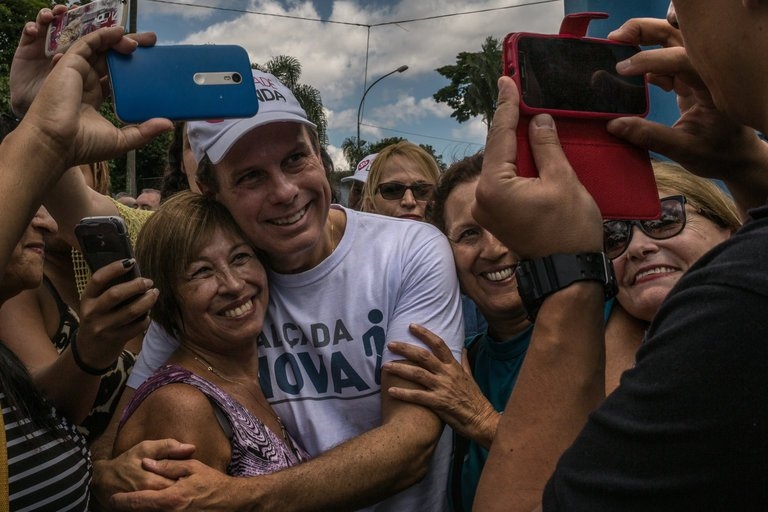
São Paulo’s mayor João Doria, center, visiting residents in the Vila Carrão neighborhood last February. Credit: Mauricio Lima for The New York Times
The International New York Times
September 25, 2017
SÃO PAULO, Brazil — A woman weeps while sitting in a corporate board room, surrounded by a couple of frowning businessmen and floor-to-ceiling glass windows showcasing the São Paulo skyline. She’s sorry, she says, but she should have the right to make mistakes. It’s her first time on a reality TV show! And besides, all she did was mess up someone’s coffee order.
João Doria, a media mogul, is unsympathetic. “Our world is the real world,” he says to the weeping woman from across the table. “It’s your world that is unreal.”
Since January, a new season of reality has begun for many of us. In the United States, Donald Trump became president. Here in São Paulo, João Doria Jr. became mayor. The two men have much in common: They are conservative populists with big egos. They like to use social media to get their message out. They have both written self-help business books with uninspired titles (“The Art of the Deal” by Mr. Trump, “Lessons in Winning” by Mr. Doria).
They are also both former hosts of the reality TV show “The Apprentice.”
I wanted to get a better sense of my new mayor and what he’ll do to my city. But instead of looking at his electoral platform, his speeches or his academic record, I decided to go right to the primary source. Following in the footsteps of Emily Nussbaum, The New Yorker’s television critic, I set myself to the task of watching 31 episodes from two seasons of Mr. Doria’s “O Aprendiz,” the Brazilian franchise of Mr. Trump’s original show, to search for lessons on the nature of reality.
“O Aprendiz” is a game show that tests the business skills of a dozen candidates competing to earn a position at one of the host’s corporations. In each episode, they are assigned to teams and given a business-related task, usually sponsored by a certain company (a bank, a retail chain, an automobile manufacturer). The task often consists in selling products or creating new advertising strategies.
The average episode goes something like this: The contestants — a majority of them white and privileged — receive about $5,000 to build a small kiosk in a mall. They spend a couple of arduous days on the telephone, persuading other businesspeople to do favors such as donating products or attending marketing events. They negotiate cutthroat rates with desperate freelancers.
Suddenly, they have some kind of brilliant idea — for example, dressing someone in a fluffy heart costume to promote coffee — and this stroke of genius produces a winner. The winning team gets a luxury trip to Switzerland as a reward. Walking in the streets of Zurich, one of the participants recalls her whole excruciating day of serving coffee at a marketing event and says: “Remember how many coffee cups we served? How many people we attended to? We deserve this, don’t we?” (I imagine a real-life waiter who works for minimum-wage salary watching this and collapsing in sobs into a fetal position.)
After the first few episodes, I noticed something peculiar: The participants were reaching out to the same companies that had already sponsored the previous challenges of the season. (Let’s call it the power of networking.) They’ve also made outrageously improbable deals, like selling six bananas for $15 and earning 50 euros to wash a few dishes in an Italian hotel.
What does any of this have to do with Mr. Doria’s way of doing politics? A lot, actually.
Sometimes, as the mayor has proudly admitted, he calls one of his executive friends and asks for generous donations to the city. It doesn’t seem to matter if the company he’s requesting money from is being sued by the city or has huge debts to it. It’s the same kind of dubious, personalized style of doing business for which contestants on “O Aprendiz” are rewarded.
Look at the case of Cyrela, one of the biggest real estate companies in Brazil. Cyrela agreed to renovate the restrooms in a São Paulo park at “no cost” to the public, even though the renovation should cost about $140,000. At the time, the company was involved in a legal dispute with the city over some separate building projects. (That dispute was later settled.) Meanwhile, Cyrela also has vested interests in the forthcoming urban plan of São Paulo, which will include laws about the maximum height of new buildings.
As if it wasn’t enough, Mr. Doria has recently appointed Cyrela’s former vice president as head of a new department called the Special Secretariat for Social Investment. His first duty was to preside over the inauguration ceremony of the new toilets donated by his own former company. It was like the scene from the last episode of Season 7, when a competitor manages to persuade Saulo, the singer who won the reality show “Ídolos,” which is, of course, on the same channel as “O Aprendiz,” to perform at a marketing event.
Mr. Doria doesn’t see any conflicts of interest — though he once threatened to end an interview as soon as the issue came up. On that occasion, the journalist was questioning the mayor on his links to one of his many private-sector pals: the owner of a drugstore chain called Ultrafarma, who happens to be a member of Lide, an events company founded by Mr. Doria and now run by his son. The group often promotes business events with the participation of politicians.
According to news reports, Ultrafarma made a $190,000 donation to São Paulo’s public drug dispensaries last February. (The mayor’s press office denies this.) A day later, the mayor posted a video in which he personally advertised Ultrafarma’s vitamin brand before a meeting of his cabinet.
The following month, Ultrafarma made an official donation to the municipality, this time in the form of prime-time TV advertisements for Mr. Doria’s controversial cleanup program “Cidade Linda” (Beautiful City), which has been criticized by many citizens as a boondoggle. It’s unclear how the city itself should have benefited from this donation.
What’s even more worrying is that this “Aprendiz”-like behavior may not be confined to São Paulo. Mr. Doria is considered a possible candidate for the 2018 presidential elections. From a business perspective, a timely donation to the city may pay off more than making a contribution to a political campaign.
In fact, this ethical minefield in Mr. Doria’s administration has emerged soon after the Supreme Court decided to ban corporate donations to political campaigns. The goal was precisely to weaken the ties between the government and business interests that could lead to bribery and other forms of corruption.
But Mr. Doria remains unperturbed in his polo shirt while managing ethically questionable decisions. The mayor had already restricted the autonomy of the Office of the Municipal Comptroller General, the city’s recently created anticorruption agency, and last month he fired the acting comptroller general “for administrative and operational reasons.” As a protest, three officials at the agency resigned, including the head of the integrity department.
Curiously, in the fifth episode of Season 8 of “O Aprendiz,” Mr. Doria fired a contestant for using his connections with a business executive to get ahead in one of the challenges. “This country will change only when it has ethics, principles,” Mr. Doria declared vehemently while brandishing a silver pen. Donald Trump would be proud.
Vanessa Barbara, a contributing opinion writer, is the editor of the literary website A Hortaliça, and the author of two novels and two nonfiction books in Portuguese.
A version of this op-ed appears in print on September 26, 2017, in The International New York Times.

